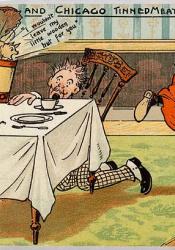The Jungle by Upton Sinclair
Author of The Jungle (1906), Upton Sinclair was a famous American writer and social revolutionary from California. Sinclair was a self-proclaimed socialist who focused on journalism and literary realism; as a journalist, Sinclair was known for his muckraking pieces meant to expose working conditions and the lives of the poor and working class in America. Arguably his most famous novel, The Jungle is a book that was written as a scandalous report exposing the meat packing industry in Chicago. While Sinclair wasn’t initially aiming to influence the Food and Drug Administration, his honest and at times revolting depictions of the industry and its sanitary conditions was one of the driving factors for the implementation of the Pure Food and Drug Act (Social Security History). Even though The Jungle drew attention towards industry in America, Sinclair also wrote about a variety of issues and covered international events. As stated by the Social Security Administration, Upton Sinclair was highly praised—specifically by Edmund Wilson—saying: “Practically alone among the American writers of his generation, Sinclair put to the American public the fundamental questions raised by capitalism in such a way that they could not escape them” (Social Security History).
The Jungle, written in 1906, was an exposé on the working conditions of the meat packing industry in the United States. While this book was set in Chicago, this story was applicable to every meat packing factory in the US as this was a standard due to lack of regulations and health department intervention. Sinclair’s descriptions and depictions of meat as diseased, rotten, and mixed in with animals and human appendages disturbed the public country-wide, influencing the government to enforce federal laws supporting health code standards and food safety expectations. While the novel took inspiration from Sinclair’s experiences in what was coined Packingtown in Chicago, The Jungle is still advertised as fiction as it reflects his views on the industry. Staying true to the nationalities of the workers in Packingtown, Sinclair based his main character off of Lithuanian immigrants and centered his story around his fictional character Jurgis Rudkis (“Muckraking the Meat-Packing Industry”).
Disillusioned with the working conditions in the United States, Rudkis was thrust into an industry that didn’t value its workers, didn’t regulate working conditions, and didn’t regulate living wages for fair hours; with these conditions, Rudkis recalls the hundreds of instances where workers would come to work with skin diseases, workers losing appendages on assembly lines, workers who were injured after carrying hundred pound carcasses, workers contaminating meat with tuberculosis, a lack of access to running water and the use of outhouses or lack thereof, and workers actively eating while on the assembly lines. An entire chapter was dedicated to the processing of meat despite said meat being contaminated, diseased, mislabeled, and made to appear appetizing with chemicals and dyes. Sinclair included that meat sent for canning was often infested with sawdust, human waste, rat feces, rat poison, and dead rats on more than one occasion. Sinclair accurately depicted the fate of many of these industry workers, using Rudkis to demonstrate how those in the working class suffered in a system such as this (“Muckraking the Meat-Packing Industry”).
Because of Sinclair’s publications of the story in The Appeal to Reason and later as a novel, there was a public outcry and the information within the novel spread like wildfire. The Jungle became an international bestseller; despite its popular status, many who read the novel ignored the suffering of the working class and instead focused on the conditions of the meat packing industry. Sinclair himself proclaimed, “I aimed at the public’s heart and by accident I hit the stomach” (“Muckraking the Meat-Packing Industry”). These same avoidances of working-class conditions are prevalent today as lower-class Americans are largely ignored and other issues are prioritized. Upton Sinclair wrote The Jungle as a social commentary and tried to advertise his work as a firsthand account of what many Americans had to suffer through in order to survive. While the concept of poor working conditions has evolved since 1906, much of it still remains relevant today. Instead of acknowledging dangerous conditions for workers, middle and upper-class Americans in 1906 were more concerned with the health hazards they were consuming from the meat packing industry; today’s middle and upper-class society chooses to ignore how difficult the pandemic has been on people and demonstrate an extreme disconnect to real-world issues such as the skyrocketing living expenses and stagnant minimum wage. Both The Jungle and the Great Resignation expose the hypocritical and selective awareness of the upper-class and how their tone-deaf attitudes about the capitalist society we live in isn’t sustainable for most of its participants.
Related Links:
https://editions.covecollective.org/chronologies/literary-event-grapes-wrath
Works Cited
“The Boycott on 'The Jungle'; Upton Sinclair's Book in Trouble in the Packing Centres.” The New York Times, The New York Times, https://timesmachine.nytimes.com/timesmachine/1906/05/18/101840262.html?....
“Bria 24 1 b Upton Sinclairs the Jungle: Muckraking the Meat-Packing Industry.” Constitutional Rights Foundation, Civics Renewal Network, https://www.crf-usa.org/bill-of-rights-in-action/bria-24-1-b-upton-sincl....
“Upton Sinclair.” Social Security History, Social Security Administration, https://www.ssa.gov/history/sinclair.html.

